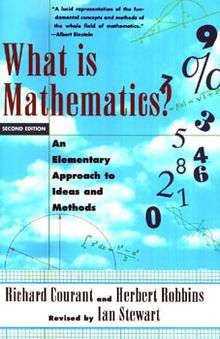What Is Mathematics?
 Cover of 1996 second edition | |
| Author | Richard Courant and Herbert Robbins |
|---|---|
| Language | English |
| Subject | Mathematics |
| Publisher | Oxford University Press |
Publication date | 1941 |
| ISBN | 0-19-502517-2 |
| OCLC | 16608993 |
What Is Mathematics? is a mathematics book written by Richard Courant and Herbert Robbins, published in England by Oxford University Press. It is an introduction to mathematics, intended both for the mathematics student and for the general public.
First published in 1941, it discusses number theory, geometry, topology and calculus. A second edition was published in 1996 with an additional chapter on recent progress in mathematics, written by Ian Stewart.
Authorship
The book was based on Courant's course material. Although Robbins assisted in writing a large part of the book, he had to fight for authorship. Nevertheless, Courant alone held the copyright for the book. This resulted in Robbins receiving a smaller share of the royalties.[1][2]
Title
Michael Katehakis remembers Robbins' interest in the literature and Tolstoy in particular and he is convinced that the title of the book is most likely due to Robbins, who was inspired by the title of the essay What is Art? by Leo Tolstoy. Robbins did the same in the book Great Expectations : The Theory of Optimal Stopping he co-authored with Yuan-Shih Chow and David Siegmund, where one can not miss the connection with the title of the novel Great Expectations by Charles Dickens.
According to Constance Reid,[2] Courant finalized the title after a conversation with Thomas Mann.
Translations
- The first Russian translation «Что такое математика?» was published in 1947; there were 5 translations since then, the last one in 2010.
- The first Italian translation, Che cos'è la matematica?, was published in 1950. А translation of the second edition was issued in 2000.
- The first German translation "Was ist Mathematik?" was published in 1962.
- A Spanish translation of the second edition, ¿Qué Son Las Matemáticas?, was published in 2002.
Reviews
- What Is Mathematics? An Elementary Approach to Ideas and Methods, book review by Brian E. Blank, Notices of the American Mathematical Society 48, #11 (December 2001), pp. 1325–1330
- What Is Mathematics?, book review by Leonard Gillman, The American Mathematical Monthly 105, #5 (May 1998), pp. 485–488.
Editions
- Richard Courant and Herbert Robbins (1941). What is Mathematics?: An Elementary Approach to Ideas and Methods. London: Oxford University Press. ISBN 0-19-502517-2.
- (1996) 2nd edition, with additional material by Ian Stewart. New York: Oxford University Press. ISBN 0-19-510519-2.
- Courant, Richard; Robbins, Herbert (2015). Qu'est-ce que les mathématiques ? Une introduction élémentaire aux idées et aux méthodes. Cassini. ISBN 9782842252045. French translation of the second English edition by Marie Anglade and Karine Py.
- Courant, Richard; Robbins, Herbert; Stewart, Ian (2002). ¿Qué Son Las Matemáticas? Conceptos y métodos fundamentales (in Spanish). México, D. F.: Fondo de Cultura Económica. ISBN 968-16-6717-4. Spanish translation of the second English edition.
- Courant, Richard; Robbins, Herbert (1950). Che cos'è la matematica? Introduzione elementare ai suoi concetti e metodi (in Italian). Turin: Einaudi. (first Italian translation, from the 1945 English edition)
- Courant, Richard; Robbins, Herbert (1971). Che cos'è la matematica? Introduzione elementare ai suoi concetti e metodi (in Italian). Turin: Boringhieri. (based on the previous Eianudi's edition)
- Courant, Richard; Robbins, Herbert (1984). Toán học là gì (in Vietnamese). Hanoi: Khoa học Kỹ thuật. (Vietnamese translation by Hàn Liên Hải from the Russian edition)
- Courant, Richard; Robbins, Herbert; Stewart, Ian (2000). Che cos'è la matematica? Introduzione elementare ai suoi concetti e metodi (in Italian). Turin: Bollati Boringhieri. ISBN 88-339-1200-0. (Italian translation of the second English edition)
References
- ↑ Page, Warren; Robbins, Herbert (1984), "An Interview with Herbert Robbins", The College Mathematical Journal, The Mathematical Association of America, 15 (1): 5, doi:10.2307/3027425, JSTOR 3027425
- 1 2 Reid, Constance, Courant in Göttingen and New York. The story of an improbable mathematician. Springer-Verlag, New York-Heidelberg, 1976. ii+314 pp.
- Herbert Robbins, Great Expectations: The Theory of Optimal Stopping, with Y. S. Chow and David Siegmund. Boston: Houghton Mifflin, 1971.